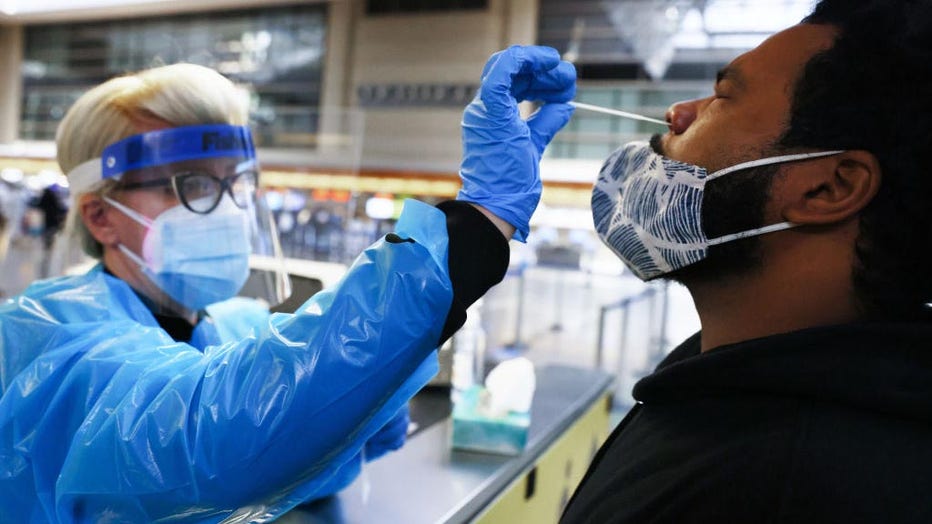Negative COVID-19 test now required for all international flights to US — here’s what you need to know
WASHINGTON - The United States now requires proof of a negative COVID-19 test or proof of recovery from all air travelers arriving to the country, including U.S. citizens.
The travel requirement comes as the U.S. works to expand testing and vaccine availability amid rising cases of a new, more contagious coronavirus variant first detected in the U.K. A previous U.S. order issued in December required proof of a negative test from travelers arriving from Britain because of the variant.
Here’s what you need to know about the new testing requirement:
Who is required to show proof of a negative test or recovery to enter the U.S.?
The order, which went into effect Tuesday, applies to both U.S. citizens and foreign nationals. All air travelers aged 2 and older must comply with the requirement — regardless of vaccination or antibody status, according to the U.S. Centers for Disease Control and Prevention.
The order also applies to those briefly entering the U.S. for a connecting flight.
The CDC said the order does not apply to air passengers flying from U.S. territories, which include American Samoa, Guam, Northern Mariana Islands, Puerto Rico and the U.S, Virgin Islands.
How soon should I take a test and what COVID-19 tests qualify?
U.S. officials say those who plan to travel internationally must get tested no more than three days prior to flying to the U.S. and show the negative test result or proof of recovery to the airline before boarding.
Passengers must provide written documentation of a laboratory test result.
The CDC says an at-home test kit that is tested in a laboratory "should meet the requirements, if such methods have been approved by the country’s national health authorities."

A man receives a nasal swab COVID-19 test at Tom Bradley International Terminal at Los Angeles International Airport (LAX) on Dec. 22, 2020 in Los Angeles, California. (Photo by Mario Tama/Getty Images)
What if I recently recovered from COVID-19?
For travelers who had a positive viral test within the past three months and have met the criteria to end isolation, they can provide documentation of recovery to the airline.
This includes proof of a recent positive viral test and a letter from a healthcare provider or a public health official giving clearance to travel. The CDC says the letter can be used to show an individual is cleared to travel, even if travel isn’t specifically mentioned.
Who will check my documentation at the airport?
The airline will confirm a COVID-19 negative test result or documentation of recovery for all passengers before boarding — and are ordered to stop passengers from boarding who fail to provide the required information, the CDC says.
Are there any exceptions to the new travel requirement?
U.S. officials say exemptions may be granted "on an extremely limited basis" when emergency travel — such as an emergency medical evacuation — is needed to "preserve someone’s life, health against a serious danger, or physical safety and testing cannot be completed before travel."
"Testing does not eliminate all risk," CDC Director Robert R. Redfield said earlier this month, when the order was announced. "But when combined with a period of staying at home and everyday precautions like wearing masks and social distancing, it can make travel safer, healthier, and more responsible by reducing spread on planes, in airports, and at destinations."
U.S. officials ask citizens to "reconsider non-essential travel abroad"
As the broadened travel requirement took effect, U.S. officials said citizens should "reconsider non-essential travel abroad," and those who do travel internationally should consider testing availability and turnaround times in the planned destination.
"You could test positive and have to stay abroad," a notice from the State Department reads. "If you test positive, you will not be able to return home as planned. What plan do you have in case you cannot come home for several weeks? Where will you stay? How will you finance your stay?"
It also says travelers should consider the availability and quality of medical care, as well as their coverage of health insurance while abroad.
The novel coronavirus has infected nearly 100 million people around the world, and killed more than 2.1 million, data compiled Jan. 26 by Johns Hopkins University shows.
The U.S. leads the world in confirmed COVID-19 infections and virus-related deaths, totaling 25.2 million and 421,000, respectively.
RELATED: Biden signs 10 executive orders on pandemic, warns things will ‘get worse before they get better’
This story was reported from Cincinnati.


